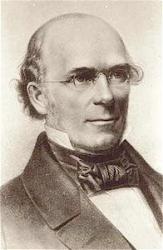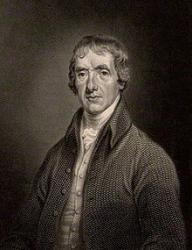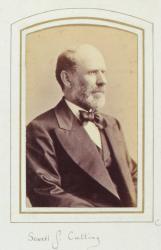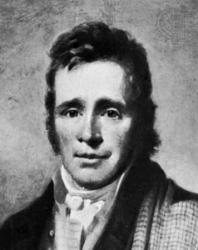Planning worship?
Check out our sister site, ZeteoSearch.org,
for 20+ additional resources related to your search.
- |
User Links
Person Results
‹ Return to hymnal




Export as CSV
Theodore Parker

1810 - 1860 Person Name: T. Parker Hymnal Number: 156 Author of "Christ the Way, the Truth and the Life" in A Book of Hymns for Public and Private Devotion (15th ed.) Parker, Theodore, M.A., was born at Lexington, Massachusetts, Aug. 24, 1810; laboured with his father as a farmer and mechanic; entered Harvard College in 1830, but continued his work at home and attended the College for examinations; attended the Divinity School from 1834 to 1836, and became pastor of the Unitarian congregation in West Roxbury, June 21, 1837. He received the degree of M.A. from his College in 1840. Changes in his theological views led him to undertake the pastorate of a congregation in Boston, in January 1846. He continued his writing, preaching, and lecturing till 1859, when bleeding at the lungs compelled him to seek relief in Europe. He died at Florence, May 10, 1860. His publications were numerous, and have been republished in Great Britain. An extended list is given, together with 12 poetic pieces, in Putnam's Singers and Songs of the Liberal Faith, Boston, U. S. A., 1875. His life has been published by Weiss, and by Frothingham. A few of his poetical pieces are given in American Unitarian hymn-books.
These include :—
1. In darker days and nights of storm. Almighty Love. "Introduced in a sermon which Mr. Parker preached, entitled ‘The Practical Effects of the Ecclesiastical Conception of God.’”
2. 0 Thou great Friend of all the sons of men. Jesus the Way, the Truth, and the Life. This in the original is a sonnet. Altered for use as a hymn, it is widely used by American Unitarian; and is also given in some English hymnbooks.
-- John Julian, Dictionary of Hymnology (1907)
Theodore Parker
John Aikin

1747 - 1822 Person Name: Aikin Hymnal Number: 580 Author of "In Time of War" in A Book of Hymns for Public and Private Devotion (15th ed.) Aikin, John, M.D., 1747-1822. The brother of Mrs. Barbauld,son or Dr. Aikin of the Warrington Academy. As a physician he practised at Warrington and Yarmouth, and from 1798 till the time of his death lived at Stoke Newington. Author (with his sister), of Evenings at Home, editor of the General Biographical Dictionary, and for some time of the Monthly Magazine. His hymn In time of war, "While [what] sounds of war are heard around," was very popular. It is in Kippis and Martineau’s Hymns for the Christian Church and Home.
--John Julian, Dictionary of Hymnology (1907)
John Aikin
Robert Nicoll
1814 - 1837 Person Name: Nicoll Hymnal Number: 415 Author of "God Save the Poor!" in A Book of Hymns for Public and Private Devotion (15th ed.) Nicoll, Robert, was born Jan. 7, 1814, at Auchtergaven, Perthshire. At the age of 13 he began to write verse. In 1835 he opened a circulating library in Dundee, and in the following year he became the editor of the Leeds Times. This he retained for a short time only. Broken in health through taxing his strength too much, he died in 1837, He was a successful writer, and is often referred to as "a second Burns." His Poems and Lyrics were published in 1835; 2nd ed., with numerous additions and Memoir, 1842; 3rd ed. 1852.
From these Poems the following pieces are taken:—
1. An offering to the shrine of power. The Reformers.
2. I may not scorn the meanest thing. Humility. This and No. 1 date 1835.
3. Lord, from Thy blessed throne, (People's Anthem.) (1842.)
--John Julian, Dictionary of Hymnology, Appendix, Part II (1907)
Robert Nicoll
Sewall S. Cutting

1813 - 1882 Person Name: S. S. Cutting Hymnal Number: 509 Author of "Family Hymn. Evening" in A Book of Hymns for Public and Private Devotion (15th ed.) Cutting, Sewell Sylvester, D.D., a Baptist Minister, was born at Windsor, Vermont, Jan. 19, 1813, graduated at the University of Vermont, 1835, and was ordained at Boylston, Massachusetts, 1836. He was pastor at Southbridge, Mass., from 1837 to 1845. Editor of the New York Recorder. 1845-50, and 1853-55; and of the Christian Review, 1850-53, and 1855-68. In 1868 he was appointed Professor of Rhetoric and History at the University, Rochester, N. York, and Secretary of the American Baptist Educational Commission. He died at Brooklyn, Feb. 7, 1882. His Historical Vindication of the Baptists was published in 1858.
His hymns in common use include:—
1. Father, we bless the gentle care. The love of God. Appeared in Hymns for the Vestry and Fireside, Boston, 1841.
2. Gracious Saviour, we adore Thee. Holy Baptism. Appeared in Winchell's Additional Hymns, 1832, No. 509 (the author being then but 19); again in the Psalmist, 1843, and others.
3. Great God, Thy glories blaze. Praise to God the Father. Appeared in Linsley and Davis's Select Hymns, 1836-41, No. 514. In the Psalmist, 1843, it was altered to "God of the world, Thy glories shine." This is repeated in several collections, including the Baptist Praise Book, 1871, in 4 stanzas of 4 lines. In the Baptist Service of Song, 1871, it is given as "God of the world, near and afar," is expanded into 5 stanzas, and is dated 1835.
4. 0 Saviour, I am blind, Lead Thou my way. The True Guide. This hymn, in I. D. Sankey's Sacred Songs and Solos, is also by Dr. Cutting. [Rev. F. M. Bird, M.A.]
--John Julian, Dictionary of Hymnology (1907)
Sewall S. Cutting
James Hogg

1772 - 1835 Person Name: Hogg Hymnal Number: 55 Author of "Praise to the God of Nature" in A Book of Hymns for Public and Private Devotion (15th ed.) Hogg, James, second son of Robert Hogg, was born in Ettrick Forest, Selkirkshire, January 25, 1772, according to his own account, though the baptismal date is December 9, 1770. He is perhaps best known as the Ettrick Shepherd, and friend of Professor John Wilson and Sir Walter Scott. He died November 21, 1835, on his farm of Altrive in Yarrow. An edition of his Poetical Works was published in 1822 in 4 vols. (Edin., A. Constable) including the best of his poems—- The Queen's Wake, 1813; The Pilgrims of the Sun, 1815; Mador of the Moor, 1816, &c. The two hymns by him which have come into use are, "Blessed be Thy name for ever," and "O Thou that dwellest in the heavens high." A complete edition of his prose and verse was pub. in 2 vols., 1865 (Glas., W. G. Blackie).
1. Lauded be Thy Name for ever. Morning. This is "The Palmer's Morning Hymn" (in 32 lines), which forms a part of Canto iv. of his poem Mador of the Moor, 1816. It is sometimes given in this form, but more frequently as "Blessed be Thy Name for ever" (2 stanzas of 8 lines), as in the Society for Promoting Christian Knowledge Hymns, 1852, and others. It is also altered as "Lord of life, the Guard and Giver," as in Mercer, &c.
2. 0 Thou that dwellest in the heavens high. Midnight. This was given,together with music, as "A Cameronian's Midnight Hymn," in 8 stanzas of 4 lines, in his tale of The Brownie of Bodsbeck, 1818. Although found in several collections its use is not so great as that of No. 1. [Rev. James Mearns, M.A.]
-- John Julian, Dictionary of Hymnology
James Hogg
Jones Very
1813 - 1880 Hymnal Number: 77 Author of "God’s Fatherly Care" in A Book of Hymns for Public and Private Devotion (15th ed.) Very, Jones, was born at Salem, Massachusetts, Aug. 28, 1813, his father, Jones Very, being a shipmaster. He graduated at Harvard College in 1836. He remained at his College, as tutor in Greek, for two years, and then entered the Unitarian Ministry (1843). He has been engaged in the work of a preacher without a pastorate from the first, a great part of his time being devoted to literary pursuits. In 1839 he published a volume of Essays and Poems, from which several pieces have been taken as hymns, including:—
1. Father! I wait Thy word. The sun doth stand. Waiting upon God.
2. Father, there is no change to live with Thee. Peace in the Father's Care.
3. Father! Thy wonders do not singly stand. The Spirit-Land.
4. Wilt Thou not visit me? The Divine Presence desired.
These hymns were included in Longfellow and Johnson's Unitarian Book of Hymns, 1846. In the same collection also appeared:—
5. I saw on earth another light. The Light Within.
6. The bud will soon become a flower. Sowing and Reaping.
7. Turn not from him who asks of thee. Kind Words.
In addition the following hymns appeared in Longfellow and Johnson's Hymns of the Spirit, 1864 :—
8. One saint to another I heard say,"How long?" The Future anticipated.
9. There is a world eye hath not seen. The Spirit World.
Most of these hymns are in the Lyra Sacra Americana, 1868; and in Putnam's Singers and Songs of the Liberal Faith, 1874. [Rev. F. M. Bird, M.A.]
--John Julian, Dictionary of Hymnology (1907)
================
Very, J., p. 1219, i. His hymn, "O heavenly gift of love divine" (Divine assistance asked), from his Poems and Essays, 1839, is given in The Pilgrim Hymnal, 1904. He d. May 8, 1880.
--John Julian, Dictionary of Hymnology, New Supplement (1907)
================
Very, Jones. (Salem, Massachusetts, August 28, 1813--May 8, 1880, Salem). He was brother of Washington Very. He graduated from Harvard College in 1836, and served as tutor in Greek there for two years. Although Julian (p. 1219) says that he entered the Unitarian ministry in 1843, he was never ordained as a settled minister though he served frequently as an occasional lay preacher. Most of his life was given to literary pursuits. In 1839 he published Essays and Poems, and thereafter was a frequent contributor in prose and verse to periodicals, including The Christian Register and the Monthly Magazine.
--Henry Wilder Foote, DNAH Archives
Jones Very
Andrews Norton
1786 - 1853 Person Name: Norton Hymnal Number: 322 Author of "Fellowship of His Sufferings" in A Book of Hymns for Public and Private Devotion (15th ed.) Norton, Andrews, D.D., son of Samuel Norton, was born at Higham, Massachusetts, Dec. 31, 1786, and was educated at Higham, and at Harvard College. After being engaged there for a short time as a tutor, he was appointed Librarian, and subsequently Lecturer on Biblical Criticism, as successor to Dr. Channing. When the Theological School was opened in 1819 he became Dexter Professor of Literature. This position he held until 1830. He died at Newport, Rhode Island, Sept. 18, 1853. He was for some time editor of the General Repository and Review, and published several prose works, one of the most extensive being The Genuineness of the Gospels, in 4 volumes. His hymns are few in number, and are mainly meditations in verse. They were contributed to various periodicals, and after his death were collected and published in a small volume. Of these hymns the following are in common use:--
1. Another year, another year, The unceasing rush, &c. Close of the Year. Appeared in the Christian Examiner in Nov. and Dec. 1827, in 11 stanzas of 4 lines. It is used in an abbreviated form. In the American Boston Unitarian Hymns [&Tune] Book, 1868, it begins with st. vi., "O what concerns it him whose way."
2. Faint not, poor traveller, though thy way. Fortitude. Printed in the Christian Disciple, July and Aug., 1822, in 7 st. of 4 1., and again in the West Boston Collection, 1823.
3. He has gone to his God, he has gone to his home. Burial. Printed in the Christian Examiner, Jan. and Feb., 1824.
4. My God, I thank Thee! may no thought. Trust and Submission. Appeared in the Monthly Anthology and Boston Review, Sept., 1809. This is his earliest and best known hymn.
5. 0 stay thy tears:for they are blest. Burial of the Young. Printed in the General Repository and Review, April, 1812, in 5 st. of 4 1. In 1855, st. iii.-v. were given in Beecher's Plymouth Collection, No. 1094, as "How blest are they whose transient years."
6. Where ancient forests round us spread. Dedication of a Church. This "Hymn for the Dedication of a Church," is dated 1833.
These hymns are in some of the American hymnals. Nos. 1, 4, 5 are in Martineau's Hymns, 1873, and the full texts of all are in Putnam's Singers and Songs of the Liberal Faith, Boston, U.S.A., 1875. [Rev. F. M. Bird, M.A.]
--John Julian, Dictionary of Hymnology (1907)
Andrews Norton
William Staughton
1770 - 1829 Person Name: Staughton Hymnal Number: 317 Author of "Onward and Upward" in A Book of Hymns for Public and Private Devotion (15th ed.) Staughton, William. (Coventry, Warwickshire, England, January 4, 1770--December 12, 1829, Washington, D.C.). Baptist. Son of Sutton and Keziah Staughton. Bristol College, 1792; honorary D.D. from Princeton College, 1798. Pastorates at Georgetown, South Carolina, 1793-1795; Bordentown, New Jersey, 1795-1798; Burlington, N.J., 1798-1805; Philadelphia, Pennsylvania, 1805-1823. In 1782 he published a volume of Juvenile Poems. The hymn "Pardoning Love" which was included in that collection, begins "Involved in guilt and near despair/Depressed with shame, o'erwhelmed with tears."
Throughout his career, Staughton continued to give expression to his thoughts in verse. One of his hymns, "Tell us, ye servants of the Lord," is found in Select Hymns (Linsley and Davis, 1841) and other collections. The following hymn was written by Staughton to be sung to the tune of the "Marseilles Hymn":
Ye sons of God awake in Glory
A host of foes before you lies.
In 1827, Staughton edited Woodward's revised and corrected edition of Dr. Rippon's Selection with the names of the tunes adapted to the hymns, and an appendix from the Olney Hymns, with additional hymns, original and selected.
Memoir was published in 1834 by his son-in-law Rev. S.W. Lynd, D.D.
--Alan Wingard, DNAH Archives
William Staughton
James H. Perkins
1810 - 1849 Person Name: J. H. Perkins Hymnal Number: 356 Author of "Spiritual Presence" in A Book of Hymns for Public and Private Devotion (15th ed.) Perkins, Rev. James Handasyd. (Boston, Massachusetts, July 31, 1810--December 14, 1849, near Cincinnati, Ohio). He was educated at Phillips Exeter Academy and at Round Hill School. Northampton, Mass. After a brief business experience in Boston he moved to Cincinnati, where he was admitted to the bar in 1837, but two years later he took up the Ministry-at-Large organized by the First Congregational Society (Unitarian) of Cincinnati, and later became pastor of the church. He was active in social reforms and as a lecturer, and was author of a number of essays descriptive of life in what was then the far west.
The hymn in 3 stanzas, C.M., beginning "It is a faith sublime and sure" attributed to "J.H. Perkins" in Longfellow and Johnson's Book of Hymns (1846-1848) is presumably by him, although it is not included with his poems printed in the Memoir and Writings of James Handasyde Perkins, edited by W.H. Channing, Cincinnati, 1851.
--Henry Wilder Foote, DNAH Archives
James H. Perkins
Joseph P. Bartrum
1801 - 1900 Person Name: Bartrum Hymnal Number: 208 Author of "My God, Remember Me" in A Book of Hymns for Public and Private Devotion (15th ed.) Bartrum, Joseph P. Of this American author nothing certain is known, save that he published The Psalms newly Paraphrased for the Service of the Sanctuary, at Boston, U.S.A., in 1833, and that he is supposed to have been an Unitarian. From The Psalms, &c, the version of Psalm cvi.:—“O from these visions, dark and drear," is given in several Unitarian collections in Great Britain and America. His version of Ps. lxxxvii., "Amid the heaven of heavens," is given in Holland's Psalmists of Britain, 1843, vol. ii. p. 339, together with a critical note on his work. [Rev. F. M. Bird, M.A.]
-- John Julian, Dictionary of Hymnology (1907)
Joseph P. Bartrum


 My Starred Hymns
My Starred Hymns


